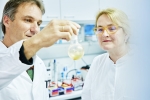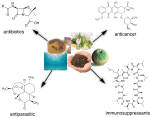
Better immune response against prostate cancer thanks to new bispecific antibodies
TWYCE, a Tübingen-based start-up spun off from the German Cancer Research Center in Heidelberg and the Faculty of Medicine at the University of Tübingen, is focused on developing a combinatorial therapy using two bispecific antibodies from bench to clinical practice. The founders aim to introduce an effective strategy for combating solid tumours, with initial proof of concept targeted at prostate cancer.
https://www.gesundheitsindustrie-bw.de/en/article/news/better-immune-response-against-prostate-cancer-thanks-new-bispecific-antibodies
